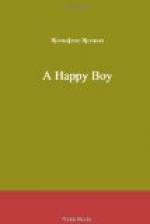It was with this in his tightly closed hand that he went in to his brother, imploring peace, and was about to explain everything.
A little girl had seen him digging in the ashes, some boys on their way to a dance had noticed him going down toward the place the preceding Sunday evening; the people in the house where he lived testified how curiously he had acted on Monday, and as every one knew that he and his brother were bitter enemies, information was given and a suit instituted.
No one could prove anything against Baard, but suspicion rested on him. Less than ever, now, did he feel able to approach his brother.
Anders had thought of Baard when the barn was burned, but had spoken of it to no one. When he saw him enter his room, the following evening, pale and excited, he immediately thought: “Now he is smitten with remorse, but for such a terrible crime against his brother he shall have no forgiveness.” Afterwards he heard how people had seen Baard go down to the barn the evening of the fire, and, although nothing was brought to light at the trial, Anders firmly believed his brother to be guilty.
They met at the trial; Baard in his good clothes, Anders in his patched ones. Baard looked at his brother as he entered, and his eyes wore so piteous an expression of entreaty that Anders felt it in the inmost depths of his heart. “He does not want me to say anything,” thought Anders, and when he was asked if he suspected his brother of the deed, he said loudly and decidedly, “No!”
Anders took to hard drinking from that day, and was soon far on the road to ruin. Still worse was it with Baard; although he did not drink, he was scarcely to be recognized by those who had known him before.
Late one evening a poor woman entered the little room Baard rented, and begged him to accompany her a short distance. He knew her: it was his brother’s wife. Baard understood forthwith what her errand was; he grew deathly pale, dressed himself, and went with her without a word. There was a glimmer of light from Anders’ window, it twinkled and disappeared, and they were guided by this light, for there was no path across the snow. When Baard stood once more in the passage, a strange odor met him which made him feel ill. They entered. A little child stood by the fireplace eating charcoal; its whole face was black, but as it looked up and laughed it displayed white teeth,—it was the brother’s child.
There on the bed, with a heap of clothes thrown over him, lay Anders, emaciated, with smooth, high forehead, and with his hollow eyes fixed on his brother. Baard’s knees trembled; he sat down at the foot of the bed and burst into a violent fit of weeping. The sick man looked at him intently and said nothing. At length he asked his wife to go out, but Baard made a sign to her to remain; and now these two brothers began to talk together. They accounted for everything from the day they had bid for the watch up to the present moment. Baard concluded by producing the lump of gold he always carried about him, and it now became manifest to the brothers that in all these years neither had known a happy day.




